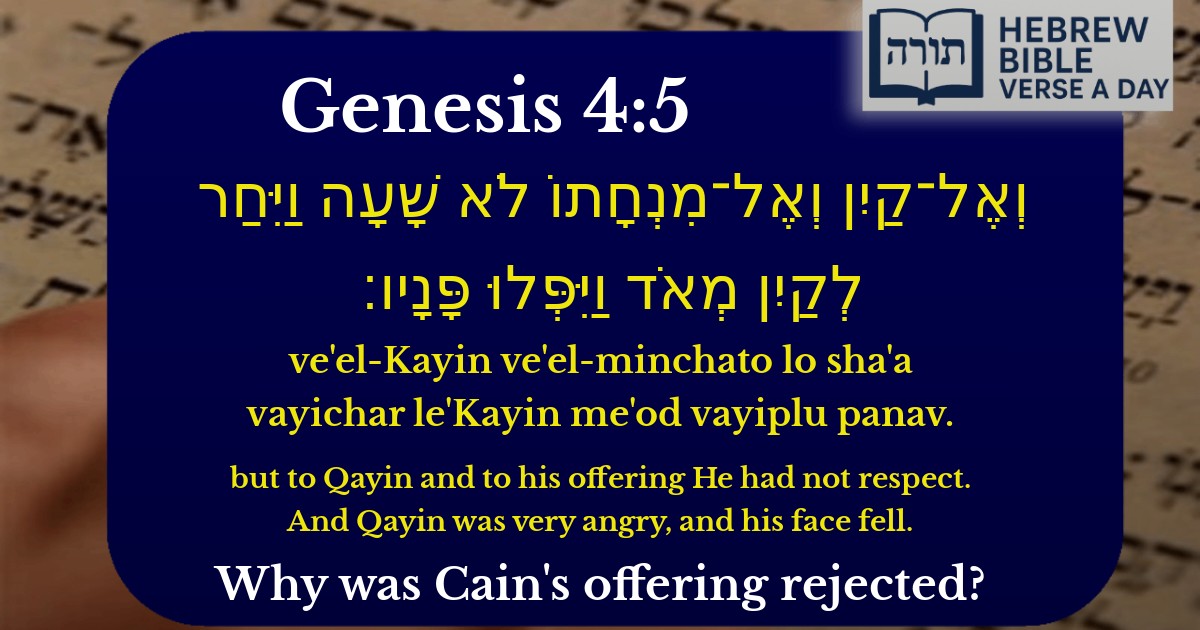Join Our Newsletter To Be Informed When New Videos Are Posted
Join the thousands of fellow Studends who rely on our videos to learn how to read the bible in Hebrew for free!
Hebrew Text
וְאֶל־קַיִן וְאֶל־מִנְחָתוֹ לֹא שָׁעָה וַיִּחַר לְקַיִן מְאֹד וַיִּפְּלוּ פָּנָיו׃
English Translation
but to Qayin and to his offering He had not respect. And Qayin was very angry, and his face fell.
Transliteration
Ve'el-Kayin ve'el-minchato lo sha'a vayichar le'Kayin me'od vayiplu panav.
Hebrew Leining Text
וְאֶל־קַ֥יִן וְאֶל־מִנְחָת֖וֹ לֹ֣א שָׁעָ֑ה וַיִּ֤חַר לְקַ֙יִן֙ מְאֹ֔ד וַֽיִּפְּל֖וּ פָּנָֽיו׃
וְאֶל־קַ֥יִן וְאֶל־מִנְחָת֖וֹ לֹ֣א שָׁעָ֑ה וַיִּ֤חַר לְקַ֙יִן֙ מְאֹ֔ד וַֽיִּפְּל֖וּ פָּנָֽיו׃
🎵 Listen to leining
Parasha Commentary
📚 Talmud Citations
This verse is quoted in the Talmud.
📖 Berakhot 61b
The verse is referenced in a discussion about divine providence and human actions, illustrating how God's rejection of Cain's offering led to his anger and subsequent actions.
📖 Sanhedrin 37b
The verse is mentioned in the context of discussing human emotions and reactions, particularly focusing on Cain's anger and its consequences.


Divine Rejection of Kayin's Offering
Rashi explains that the Torah does not specify why Hashem did not accept Kayin's offering, but the Midrash (Bereshit Rabbah 22:5) provides insight. Kayin brought an inferior offering from the פֵּרוֹת הָרְעִים (the worst of his produce), while Hevel brought מִבְּכֹרוֹת צֹאנוֹ וּמֵחֶלְבֵהֶן (the choicest of his flock and their fat). This teaches that one's attitude in bringing korbanot matters greatly—Hashem desires offerings given with generosity and sincerity.
Kayin's Emotional Response
The phrase וַיִּחַר לְקַיִן מְאֹד ("Kayin was very angry") reflects his intense resentment. Ramban notes that Kayin's anger stemmed from jealousy and a sense of injustice, as he believed his offering should have been accepted equally. The Kli Yakar adds that his anger was directed not only at Hevel but also at Hashem, revealing a flawed spiritual perspective.
The Significance of Fallen Countenance
וַיִּפְּלוּ פָּנָיו ("his face fell") symbolizes dejection and shame. The Sforno explains that Kayin's facial expression changed because he realized his offering was rejected due to his own shortcomings. The Talmud (Sanhedrin 37b) teaches that facial expressions reflect inner emotions, and Kayin's fallen face indicated his despair and unwillingness to correct his mistake.
Moral Lessons from the Incident